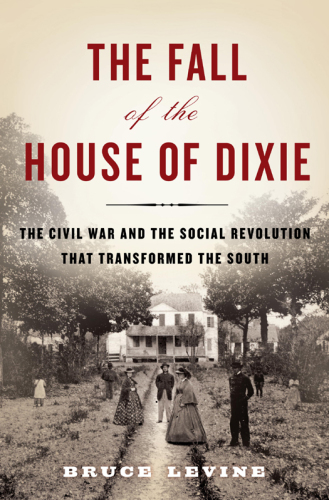
The Fall of the House of Dixie
The Civil War and the Social Revolution That Transformed the South
کتاب های مرتبط
- اطلاعات
- نقد و بررسی
- دیدگاه کاربران
نقد و بررسی

Starred review from September 24, 2012
In a deep, rich, and complex analysis of the period surrounding and including the American Civil War, University of Illinois historian Levine (Confederate Emancipation) compares the South to the House of Usher in Poe’s famous story: the prosperous and powerful South looked invincible, but it had a flaw that made its collapse slow but inevitable. The social structure and very nature of the South was torn down and transformed in a matter of years. While Levine gives some attention to military actions, he primarily concentrates on slavery and its relation to the conflict; on Lincoln’s attempt to avoid a “revolutionary, emancipationist” war, with the Emancipation Proclamation, in Levine’s view, more a matter of practicality than principle; on the complex decisions regarding the newly freed blacks and their role in the war; and on the increasing desperation of a disintegrating Southern society. With a quarter of the text given over to notes and works cited, it’s clear Levine has left no stone unturned to tell this story, and his argument is solid. For those interested in the social, political, and economic effects of the fall of slavery in America, this account is definitely enlightening. 16 pages of b&w photos. Agent: Dan Green and Simon Green, POM Inc.

Starred review from November 1, 2012
Levine (History/Univ. of Illinois; Confederate Emancipation: Southern Plans to Free and Arm Slaves during the Civil War, 2005, etc.) examines how the slaveholder republic of the Confederacy collapsed. Early on in this splendidly colorful account, the author compares the old South's disintegration to "The Fall of the House of Usher," where microscopic cracks in the mansion's foundation gradually widen until the building implodes. He extends the Poe-themed metaphor in a later chapter, invoking "The Masque of the Red Death," when the Confederate elite of Montgomery and Richmond madly partied at splendid balls in 1864-1865, even as their civilization lay in ruins. Levine acknowledges that a force of arms was necessary to bring the South to its knees, and he frequently alludes to military developments that marked the South's unfolding destruction. But how the confident exuberance of the secession spring turned into the bitter resignation of Appomattox is more than simply a story of battlefield reversals. War exposed Southern political, social and economic deficiencies in ways unanticipated by Confederate leaders. The increasingly bloody, expensive conflict shattered any number of illusions: about slaves' faithfulness, white Southern unity, cotton's supremacy, the unimportance of financial and industrial power, divine favor, unwavering martial spirit and Northern fecklessness. The war's stresses and strains widened fissures between Jefferson Davis' government and the economic elite, between master and slave, between plantation whites and the poor who shouldered a disproportionate share of the conflict's burdens. Ironically, the enslaved third of its population, second only to land as a source of Southern wealth and the war's proximate cause, emerged as Dixie's "greatest and most severe structural weakness." As the Northern armies advance in the background of his narrative, Levine recounts this tale of Southern institutional rot with the ease and authority borne of decades of study. A sensitive, informed rendering of the wrenching reformation of the South.
COPYRIGHT(2012) Kirkus Reviews, ALL RIGHTS RESERVED.

November 1, 2012
An award-winning author and University of Illinois history professor, Levine portrays the Civil War as a revolution that radically altered the social, political, and economic institutions of the South. Among those most affected, of course: the newly freed slaves.
Copyright 2012 Library Journal, LLC Used with permission.

December 1, 2012
This masterful work is essentially an examination of the political and social disintegration of the antebellum South under the strain of slow but relentless military defeat. Levine presents compelling evidence to counter revisionist arguments concerning the role of slavery in the South. He asserts that the entire edifice of Southern society was based upon the peculiar institution and the racial assumptions used to justify it. He effectively demolishes the mythology of a passive, even content slave population and illustrates how the maintenance of slavery depended on the threat and often the use of violence. Levine also acknowledges schisms in Southern society between the planter elite and the nonslaveholding majority. Once the military conflict began, the pillars of Southern society slowly eroded as men left the farms and plantations to fight and slaves refused to work and often fled into the arms of approaching Union forces. Levine's employment of testimonies by slaveholders, slaves, and pro-Union Southerners is effective and often poignant. This work will be an excellent addition to Civil War collections.(Reprinted with permission of Booklist, copyright 2012, American Library Association.)

























دیدگاه کاربران